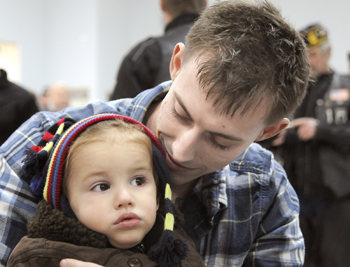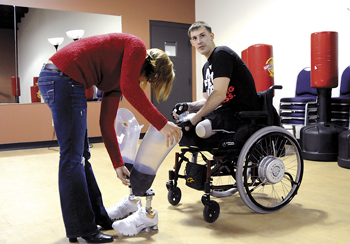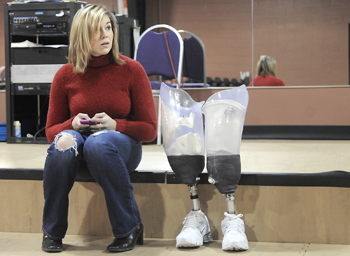
Editor's note: This is another installment in an ongoing series of stories about Sgt. Joey Jones' recovery since he lost his legs in Afghanistan. The Chattanooga Times Free Press has followed the Jones family since his injury and will continue to update readers of Joey's Journey as well as the work his family, friends and the Dawnville, Ga., community are doing while he progresses.
DALTON, Ga. -- He rolls each hip forward, swinging the blend of metal and hard plastic that forms his legs, rocking his torso steadily as he walks across the black gym floor.
The din of clanking metal weight plates and blaring hard rock fill the warehouse-sized building as Sgt. Joey Jones goes through his weekday workout.
"I come into the gym and people are like, 'Wow, I can't believe he's working out,' " Joey says. "And I'm like, 'Wow, I can't believe I used to be 6 feet tall and now I'm looking up at you.'"
As he weaves through the gym machines, a brunette woman edges closer. His head reaches her rib cage when he stands.
"I just have to say 'thank you,'" she chirps.
He returns her thanks with a half-smile and continues.
"You show them how to work out," she calls after him.
Less than five months ago, on Aug. 6, Jones was in a small market in Afghanistan, working as a 24-year-old Marine bomb technician on the hunt for improvised explosive devices. After finding a cache of bomb-making parts, he and his fellow Marines took a short break, leaning against a wall in an alleyway.
Break over, Joey took one step, preparing to head back to work.
His foot landed on a hidden improvised explosive device.
The blast took both his legs above the knee and mangled his right arm. Sent to National Naval Medical Center in Bethesda, Md., Joey underwent more than a dozen surgeries in less than six weeks. Then he was moved to Walter Reed Army Medical Center a few miles away in Washington, D.C., for further rehabilitation.
On Dec. 18, he returned home to Dawnville, Ga., for the first time since the blast, greeted by a motorcycle escort and applause at the American Legion Post 112. He has two weeks of leave, which ends shortly after the New Year's holiday, and then he returns to Walter Reed for more rehab.
In the early days of his treatment and rehabilitation, he felt as if he had to be the positive one, the one to look to the future with an optimistic eye and always-ready humor while his loved ones dealt with their own shock and pain.
That hasn't changed, and he still works to keep an upbeat attitude.
"I'm proud of everything I did that got me here," he said a few days ago at his parents' home in Dawnville. "You know, there's one footstep that I wish could be taken away. That's not bad. I can't help it [that it] resulted in me losing my legs."
RELIVING THE HORROR
A few nights before her son came home, Joyce Jones sat in her living room, watching him on television. Joey's experience, loss and charming personality have drawn local media and television hosts from Atlanta and national coverage from CBS and from ABC's "Nightline," all trying to personalize a distant war for viewers.
 Staff Photo by Angela Lewis/Chattanooga Times Free Press
Dec 19, 2010--Sgt. Joey Jones holds his son, Braiden Jones at the American Legion in Dalton, Ga., after returning from Walter Reed Army Medical Center, where he has been undergoing treatment after losing his legs in an bomb blast in Afghanistan
Staff Photo by Angela Lewis/Chattanooga Times Free Press
Dec 19, 2010--Sgt. Joey Jones holds his son, Braiden Jones at the American Legion in Dalton, Ga., after returning from Walter Reed Army Medical Center, where he has been undergoing treatment after losing his legs in an bomb blast in AfghanistanThough Joyce has been interviewed dozens of times about her son's injuries and sat beside him during seemingly endless rounds of questions from reporters, this night was different.
"CBS Evening News" showed a brief video clip -- shot from a distance -- that captured the moments after Joey lost his legs and fellow Marines hauled him to the helicopter on a stretcher.
"I don't think I really ... I really didn't look at it before," she said, her voice shaking amid pauses.
The image is so clear on the television, so unlike what someone first showed her on the Internet shortly after the blast.
"It was just like the very first day all over again," she said, tears spilling down her cheeks. "And you wonder: When does the pain stop? Does it ever get better?"
In the past four months, almost every time Joyce talks about Joey, the emotions pour out. She's grateful that her son is alive and happy at his progress, but she still feels as if she's lost something.
"I know I didn't lose my son," she said. "But I know my son is forever changed. I know he'll never be the child I raised. He's the Marine Corps' now."
STANDING ON HIS OWN
Joyce was at the Bethesda hospital with Joey's father, Joseph Jones, and Meg Garrison, Joey's girlfriend, when the Marine arrived just days after the injury. The trio cared for him as other family members visited in shifts.
Except for a brief trip to Walter Reed after Thanksgiving, Joyce has been back home in Dawnville since Oct. 20.
 Staff Photo by Angela Lewis/Chattanooga Times Free Press
Dec 21, 2010--Girlfriend Meg Garrison helps Sgt. Joey Jones remove his prosthetic legs after he worked out Tuesday at Peak Fitness in Dalton, Ga. Jones is home for the holidays after undergoing treatment for injuries suffered from an bomb blast in Afghanistan
Staff Photo by Angela Lewis/Chattanooga Times Free Press
Dec 21, 2010--Girlfriend Meg Garrison helps Sgt. Joey Jones remove his prosthetic legs after he worked out Tuesday at Peak Fitness in Dalton, Ga. Jones is home for the holidays after undergoing treatment for injuries suffered from an bomb blast in Afghanistan"It was by Joey's request," she said. "He wanted to prove that he could live without Momma's help."
In some ways, Joyce understands, but mostly she just wants to be there with her son through his recovery.
Garrison, 23, now stays with Joey in Washington. He's moved out of the hospital and into a hotel room provided by the Marine Corps. Each day he begins a packed schedule of physical and occupational rehabilitation with a short break for lunch.
In late September, Joey got his "shorties" -- the first level of prosthetic legs that he must master before moving into more advanced equipment. The legs are metal ankles that do not bend and are lodged in white tennis shoes. A foot-long aluminum tube rises from the ankle to a hard-plastic mold that cups around the stumps of his thighs.
For the first days and weeks, Joey said he had to learn to walk -- or wobble -- without falling. He held onto parallel bars for support, swinging one step at a time. But within a few weeks, he could walk with a cane and later without additional support.
"It's like constantly trying to keep your balance," he said, likening the experience to someone walking on his knees for long periods.
Once he could walk, Joey needed a job, a purpose, a duty to perform.
He and Garrison started going back to the National Naval Medical Center to see recently arrived amputees. It's something other Marines did for him when he first got back.
"All they know is, a day ago or a couple of days ago I had legs and now I don't," he said. "Their body has been mutilated, and they're going to have to live with that."
Joey and other Marines who have had time to adjust to their wounds try to keep the new arrivals focused on the long term, show them the progress they can make.
The visits back don't reopen memories of the time after the blast. That's already there.
"I wake up every day and relive the moment I lost my legs," he said. "I was fortunate or unfortunate enough to stay conscious, and I remember it. I feel it from my head to my limbs, I feel it."
His goals are still the same -- to return to Afghanistan as a bomb technician, to continue finding the devices that maimed him and are killing his fellow Marines. And if that's not possible, then he wants to return to the Florida explosives school where he trained so he can teach future bomb technicians how to avoid his fate.
Still, the dark moments remain, the lingering questions about his future, how it will play out, will it be worth all the effort? But they fade as the days, weeks and months pass.
Counseling is out. Joey doesn't do counseling.
"I'm a smart guy, I know what bothers me, and I know the best way to stop it from bothering me is to focus on what's in front of me," he said.
Garrison helps, too. Joey's girlfriend already has seen her share of hurt in Joey, his pain causing her pain. She meets each Thursday with a group of other caregivers for the wounded. It's a place to share helpful tips, tell their stories or vent frustrations.
As her emotional distress recedes, the day-to-day work keeps her and Joey focused, something she tells families of the recently wounded.
"I'm not saying we don't get emotional still," she said. "But we can go in and say, 'Hey, look, we're living our lives still and happy and we're doing things that are fun. ... Yeah, it's really hard some days. But are we still having a good time, and will you do the same thing? Absolutely, and you'll probably do it better than we did."
BACK HOME
At the end of the road where Joseph Jones built the family's home brick by brick, the driveway has moved.
Over the past few months, friends have helped Joseph haul dirt and carve out a new space for Joey. Gravel lines mark where a new carport will house Joey's truck. Plans are to extend the house's front porch so his wheelchair can roll directly from the carport to the front door. A long bedroom behind the carport will hold a bathroom and exercise area and connect to the main house.
The truck, a 2011 black Ford F-250, was waiting for Joey at the American Legion. About half has been paid for by local groups that his uncle, Jeff Jones, began contacting shortly after he visited Joey in the hospital in September.
 Staff Photo by Angela Lewis/Chattanooga Times Free Press
Dec 21, 2010--Meg Garrison sits next to Sgt. Joey Jones' prosthetic legs after Jones worked out Tuesday at Peak Fitness in Dalton, Ga. Jones is home for the holidays after undergoing treatment for injuries suffered from an bomb blast in Afghanistan
Staff Photo by Angela Lewis/Chattanooga Times Free Press
Dec 21, 2010--Meg Garrison sits next to Sgt. Joey Jones' prosthetic legs after Jones worked out Tuesday at Peak Fitness in Dalton, Ga. Jones is home for the holidays after undergoing treatment for injuries suffered from an bomb blast in AfghanistanA little more than half the money has been raised to pay for the home addition, which the family estimates will cost close to $50,000. Already, a fall festival, motorcycle rides and private donors have given to a fund set up at the Dalton branch of Regions Bank to help Joey and his family.
All of it overwhelms Joseph.
"I can't believe this town," he said. "They've been good to us. ... I didn't ever think it'd go this far."
Like his wife, Joseph loses the words when trying to describe what his son has gone through and how it affects Joey.
A brick mason by trade, Joseph sees the construction as his way to help his son. He has the expertise to do all the construction, but will need extra hands to make it happen.
"I can handle that part," he said, gazing over the gravel that outlines the floor plan and the trenches awaiting the water and sewage lines.
Now he waits for good weather and building materials.
A 50-yard hill rises from the driveway. On one side of the hilltop sits Jeff's home. On the other is the home of Joey's grandmother, Barbara. Joseph walked up that hill with his son the day after Joey got home for his leave.
"I said, 'Ain't this making you real tired? Ain't this hard to do?" Joseph recalled. "And he said, 'Yeah, it's hard to do, and it makes me tired.'"
After the first trip up and down, Joey kept walking past the drive, reached the end of the street near the treeline and turned around.
"I said, 'Where are you going?' and he said, 'I'm going back up that hill."
Joey climbed the hill three times that day.
BEING A DAD
The days after Joey's arrival passed quickly. TV and newspaper reporters followed him at home, the gym and when others congratulated him -- at the Brooker Ford dealership that housed his new truck, at the Dalton Fire Department that made him an honorary graduate of an intense, military-style training program.
With most of his family living a stone's throw from his parents' home, he'd seen them in the first couple of days after he got home. Each day, old friends from high school or earlier days drop by; some for a workout, others to go out for dinner.
Joey's 17-month-old son, Braiden, got sick the first few days with a high fever between 103 and 104, but recovered so he could spend the night with Joey -- something Joey had been looking forward to for months.
Braiden was a life-changing surprise, a boy he fathered with another woman while he and Garrison were split up. Since Braiden was born, Joey has been stationed in California, deployed to Afghanistan, then in the hospital for the last four months, so he hasn't seen much of his son, who stays with his mother near Dalton.
"If I can at least get him to recognize me when I walk in the door, which I think I have, then I've accomplished one goal for this trip," he said.
Braiden is on his mind all of the time, every day when he sweats through endless repetitions in physical therapy or hears that doctors may have to reopen his leg for more surgery or when pieces of his new legs haven't arrived.
"My efforts to walk again are simply to be a fully functional and productive dad," he said. "I have to pave the way for him, and how am I going to do that if I can't get up and walk?"
WORK FOR THE FUTURE
In the Peak Fitness gym in Dalton, a place where Joey sweated to keep in shape during his time home before heading to Afghanistan in March, Joey prepares for a workout similar to what he used to do, but with some modifications.
Sitting in his wheelchair, he slides a socklike covering over his thighs. Inside is a plastic cup that's molded to fit over the end of his thighs. The cup also has a screw hole drilled into the center.
With the covering on, he unrolls a rubberized fitting that encases the end of his thigh, helping the cup fit snugly into the shorties. Threading a metal post into the cup's screw hole, he pulls the artificial leg onto the post.
He then asks Joseph for window cleaner and sprays the ends of the fitting. The liquid helps create suction inside the joint, tightening the grip so his thighs and the plastic cups don't rub, which would create sore spots, raw skin and other complications.
Today he's working on his upper body, biceps and back. Just two weeks ago, doctors cleared him for full use of his hands and wrists, which were mangled in the blast and had to be reconstructed in surgeries. He hasn't weighed himself, but his arms and chest have filled out since September.
His right arm, like his left leg, still has bone cells spread throughout the muscle -- a product of the blast, which pulverized the bones. Those cells now have hardened and created more bone where bone shouldn't be, limiting his mobility. He can't turn his arm fully, and doctors have told him he may have further surgeries to fix the problem.
Despite his progress, he still needs help on some exercises.
TO HELPTo donate to the Joey Jones Benefit Fund, contact Regions Bank in Dalton, Ga., at 706-278-2600.
His 13-year-old nephew, Colton Lewis, brings him weight plates and pulls the bar down on a machine he can't quite reach, but the exercise is all Joey.
The amount of weight is not the same. Where once he piled on plates of iron, he now lifts 15- to 20-pound dumbbells or raises one 45-pound plate instead of three.
When he arrived in Afghanistan earlier this year, Joey was a cocksure young man, a seemingly invincible Marine with muscles layered on muscles of his 6-foot frame.
Much of that is gone and will not return. In his shorties, he stands about 4 feet tall, and his muscles have atrophied while he lay in the hospital.
But he sees the changes of the here-and-now and the challenges to come as simply a series of setbacks that he'll meet head-on.
"There was a time, laying in the hospital bed about two months ago, three months ago, where I came to a realization that there were a few character traits that I had to get rid of in order to make it through this," he said. "And pride and vanity are two of them."

